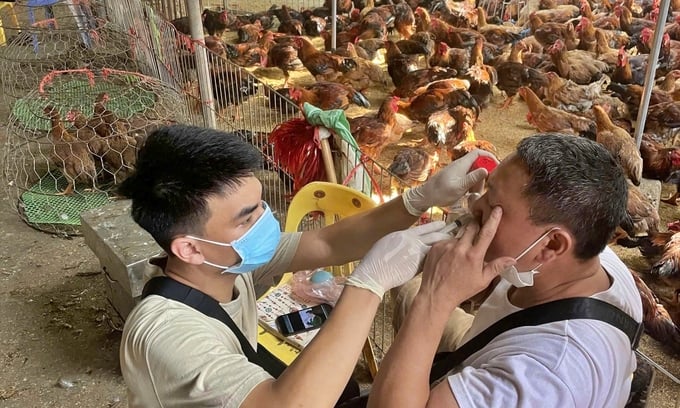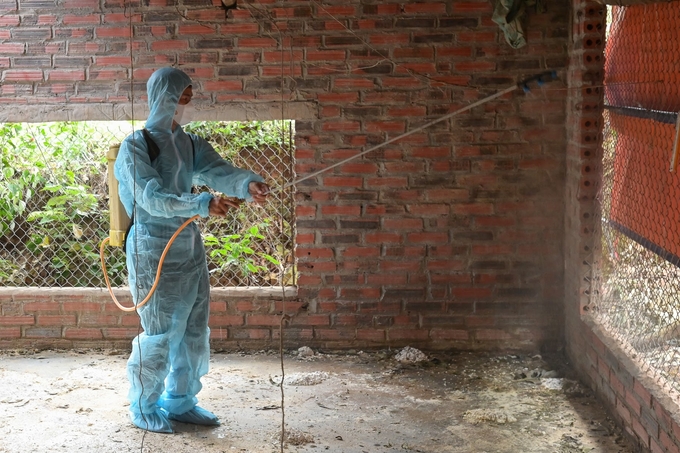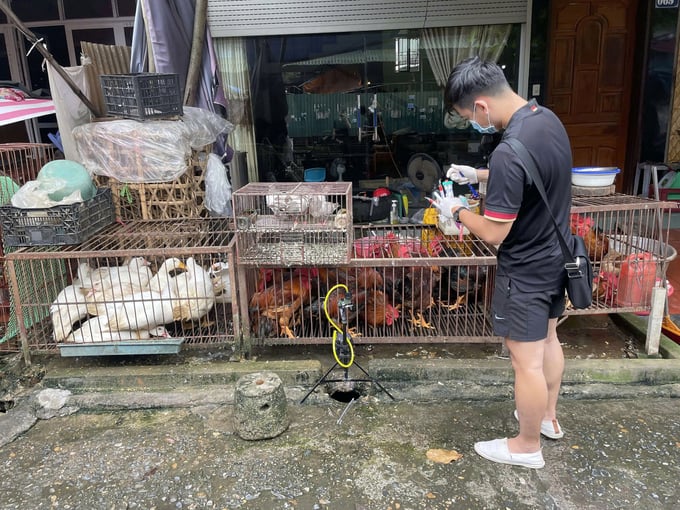October 30, 2025 | 09:11 GMT +7
October 30, 2025 | 09:11 GMT +7
Hotline: 0913.378.918
October 30, 2025 | 09:11 GMT +7
Hotline: 0913.378.918

Veterinary staff take samples from people at the poultry market. Photo: BT.
Since the start of this year, many countries around the world, including Vietnam, have recorded cases of human infection with different strains of avian influenza. After more than 10 years without detecting any cases, in October 2022, Vietnam recorded a case of human infection with influenza A (H5) in Phu Tho province. Passing to the first half of 2024, two more cases were detected.
Proactively detecting risks to prevent and combat avian influenza early and from afar is a matter of great urgency since from the first strain A (H5N1), the influenza virus now has many variants such as A (H5N6) and A (H5N8). They can appear in many places.

Leaders of the Ministry of Agriculture and Rural Development monitor the vaccination situation on pigs. Photo: Bao Thang.
A team from the International Livestock Research Institute (ILRI), in collaboration with the National Institute of Veterinary Research, Hanoi University of Public Health, One Health Group, Duke University and the University of Texas Medical Branch, collected and tested nearly 3,500 samples from poultry and environmental surfaces at multiple markets over two years, starting from January 10, 2019 to April 26, 2021.
Prof. Gregory Gray, Head of the research team, said the team applied the One Health approach throughout the investigation, focusing on live poultry markets and pig farms in the North. Although deployed during the Covid-19 outbreak, the team collected complete samples of the cloaca, throat, trachea, and fresh feces at 4 markets and 5 pig farms in 5 localities: Hanoi, Lang Son, Lao Cai, Bac Giang, and Quang Ninh.

Environmental sanitation and disinfection are ways to prevent avian influenza. Photo: Bao Thang.
At each market, the research team set up three bioaerosol samplers placed 50 cm above the ground in areas with a lot of poultry. The machines were run continuously for 4 hours to collect air at a rate of 3.5 l/min.
As for the result, the positive rate for the A (H5) strain of the virus was relatively high. Prof. Gregory Gray expressed concerns. A relatively large number of the nearly 3,500 samples collected had molecular or culture evidence of influenza A virus.
“The emergence of highly pathogenic avian influenza viruses in some Vietnamese live poultry markets shows the urgent need for action not only domestically but also internationally to minimize the spread of these viruses,” he said.
The team also reported that of the 16 human nasal swab samples taken from the poultry market that tested positive, none tested positive for H1N1 or H3N2 influenza viruses. In particular, no poultry samples tested positive for the H7 subtype. In contrast to the results from the poultry market, the prevalence of influenza A in pig farms was much lower, with only 0.4% of the 1,700 samples having molecular evidence of influenza A viruses.
Based on the results, the research team concluded that because avian influenza has been present in Vietnam for approximately 20 years, new viruses from neighboring countries, such as H7N9 strains, could mix with Vietnamese strains to create new strains that are more virulent and pose a greater threat to poultry and human health.

The research team surveyed and took samples at major poultry markets in Northern Vietnam. Photo: BT.
The prevalence of influenza A in pig farms is very low, so further research is needed in Vietnam's neighboring countries. One possible reason is that Vietnam may have controlled pig diseases well in recent times.
Through the surveillance activities implemented over 2 years, the research team also came to the conclusion that the One Health approach, when applied in a comprehensive manner, even a small field inspection team is enough to provide rapid feedback to public health forces and regulatory agencies about influenza A "hotspots".
From this observation, Dr. Nguyen Viet Hung, leader of the Health Program at the International Livestock Research Institute (ILRI), called for a wider application of the One Health approach to surveillance of pathogens in humans, animals and the environment.
Translated by Samuel Pham

(VAN) According to Deputy Minister Nguyen Hoang Hiep, just 20 days after the appeal was launched, Viet Nam received assistance from 30 countries and international organizations, with a total value of USD 9.7 million.

(VAN) SEAMAP and ROMONA sign a 2025 - 2028 Memorandum of Understanding, marking a new chapter in Viet Nam’s marine geodesy and positioning technology development.

(VAN) UNICEF, in cooperation with the Ministry of Agriculture and Environment, has provided 800 water storage tanks, 800 essential hygiene kits, and 80,000 water purification tablets to people affected by the recent floods.

(VAN) More than 32,000 plant genetic samples currently preserved in Vietnam’s National Genebank are laying the foundation for the establishment of a National Botanical Garden and the development of climate-resilient crop varieties.

(VAN) Viet Nam is emerging as a strong potential contributor to the ASEAN Economic Community, thanks to its outstanding competitiveness in manufacturing and production.

(VAN) On October 25, the VDDMA received emergency aid from Singapore for people affected by recent disasters.

(VAN) The Viet Nam Academy of Science and Technology and the Finnish Meteorological Institute have signed a five-year Memorandum of Understanding.